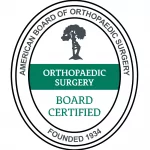When it comes to Orthopaedic care, choosing the right physician is crucial for ensuring optimal treatment and recovery outcomes.
Amongst Orthopaedic physicians, there are different levels of training and certifications. Each can significantly impact their level of expertise and capacity for providing the full spectrum of comprehensive care. When looking at a physician’s bio, especially those that are apart of the team here at CSOG, you’ve likely seen the terms: fellowship trained and board certified. But what do these terms actually mean? What type of training has the physician gone through to receive these credentials?
Fellowship Training:
Specialization and Expertise
What does fellowship trained mean? Fellowship training is an additional period of intensive, specialized training that orthopaedic surgeons pursue after completing their residency program. During this fellowship, physicians focus on a specific area within orthopaedic surgery, such as sports medicine, joint replacement, spine surgery, foot and ankle surgery, or hand and upper extremity surgery, among others. These fellowship programs require physicians to participate in hundreds of specialized surgeries to develop advanced skills and expertise in their chosen subspecialty before they’re eligible to receive the fellowship trained credential.
Benefits of Fellowship Training
- Enhanced Knowledge and Skill Set: Fellowship-trained orthopaedic physicians possess a deeper understanding of their specific area of focus due to their additional, rigorous training that allowed them to gain extensive hands-on experience from leaders within the orthopedic world. This experience enables them to address complex cases and provide highly specialized, individualized care.
- Leaders of Orthopedic Advancements: Fellowships provide consistent access to the latest research, techniques, and technologies in the specific subspecialty. Not only does this exposure keep physicians abreast of recent advancements, it allows them to continue development upon such innovation to ensure patients receive the most effective and lasting treatment options.
- Collaboration and Networking: Fellowship programs often foster collaboration and networking among specialists, enabling physicians to consult with colleagues and share knowledge across the nation. This collaborative environment further enriches their expertise and promotes the exchange of best practices.
Board Certification:
Recognized Expertise and Quality Assurance
What does Board Certified mean? Board certification is a rigorous process that evaluates a physician’s knowledge, skills, and clinical experience in a particular medical specialty. To become board certified, orthopaedic surgeons must complete a specific number of postgraduate training years. Then, they are eligible to complete a comprehensive oral and written examination administered by the American Board of Orthopaedic Surgery (ABOS) or an equivalent board such as the American Osteopathic Association (AOA) for Doctor of Osteopathic Medicine (DOs).
Importance of Board Certification
- Expertise Verification: Board certification serves as an independent
 validation of an orthopaedic surgeon’s knowledge and expertise in their specialty and demonstrates that the physician has met the meticulous standards set by the ABOS or the equivalent certifying body.
validation of an orthopaedic surgeon’s knowledge and expertise in their specialty and demonstrates that the physician has met the meticulous standards set by the ABOS or the equivalent certifying body. - Commitment to Continuous Learning: Maintaining board ce
rtification requires ongoing professional development through continuing medical education (CME) credits. These CME requirements ensure that certified physicians stay current with advancements in their field and provide patients with the most up-to-date care. - Quality Assurance: Board certification acts as a quality assurance measure for patients, as it signifies that the orthopaedic physician meets or exceeds the established standards of practice.
The Doctor’s Timeline
Becoming a physician is no easy feat. Especially one with high distinctions of Fellowship Training and Board Certification. On average, in addition to completing a four-year undergraduate degree, a physician must complete four years of medical school. After medical school, they will complete a five-year residency program. Orthopedists such as ours within CSOG, then apply for a fellowship program. Only the best candidates are granted participating into these fellowships that typically last an additional year. To become board certified, the physician must meet their respective board’s mandated training hours. Depending on the board, this can take between 3-7 years. Added together, a fellowship trained and board-certified Orthopaedic physician has undergone anywhere between 17-21 years of training and education.
With their Fellowship training and the addition of a Board certification, physicians are focused extensively on specific subspecialties, with the advanced skills necessary to ensure high quality outcomes backed with quality assurance to their commitment of providing high-quality care. In the realm of orthopaedic care, patients can rest assured they’re in qualified hands when seeking specialized or complex treatments through fellowship-trained and board-certified orthopaedic physicians.